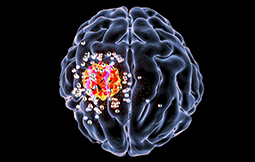
In a brain tumor surgery different doctors and surgeons often work together to create a patient’s overall treatment plan that combines different types of treatment.
In a brain tumor surgery different doctors and surgeons often work together to create a patient’s overall treatment plan that combines different types of treatment. This is called a multidisciplinary team. In brain tumor care, there are different types of surgery and surgeons who use various instruments and methods to remove your brain tumor. The procedure for brain tumor surgery involves removing a part of the bone from the patient’s skull for better access to the intracranial part of the brain. Based on where the tumor is located and accessibility of the tumor, the surgery either helps in removing it completely or partially. In cases of partial removal, the patient might also need chemo or radiation posts the brain tumor surgery.
Some of the very common symptoms that might indicate a brain tumor include:
Your neurosurgeon will recommend a tumor surgery to treat brain tumor and also to:
Before performing the actual surgery the surgeon will first recommend a biopsy to diagnose the type of tumor and then decide the right plan for brain surgery or brain tumor treatment based on the reports. The biopsy takes usually a single day procedure that is conducted in the hospital’s day care. Once the treatment plan is ready, the surgeon will give the following instructions:
Surgery to remove brain tumor is performed under general anesthesia by a reputed neurosurgeon and his competent team. Since this is an extensive surgery, it can take anywhere between 4 to 8 hours to finish the whole procedure. The following are the steps involved in the surgical technique:
After the brain tumor surgery, the patient is kept in the hospital for one or two weeks. In case when only partial tumor is removed, patients might have to undergo chemo or radiation just after the surgery to kill the cancer cells still remaining in the brain. In many of the cases, there is a slight swelling in the brain after the surgery. The team of doctors will constantly keep a check on the patient to ensure the coordination of the brain and body post-op. For instance, pupils are checked by flashing light in the eyes and strength of the arms and legs is also regularly monitored. Once the patient is discharged, the doctor will recommend:
Generally, it will take at least 2-3 months for patients to recover completely after this surgery.
Brain tumor surgery is a complex surgery and it comes with quite a few risks and complications. The surgeon will explain all the pros and cons of the surgery and help the patient understand the severity of the associated risks. Some of the known complications include:
Copyright © 2025 IMA | All Rights Reserved.